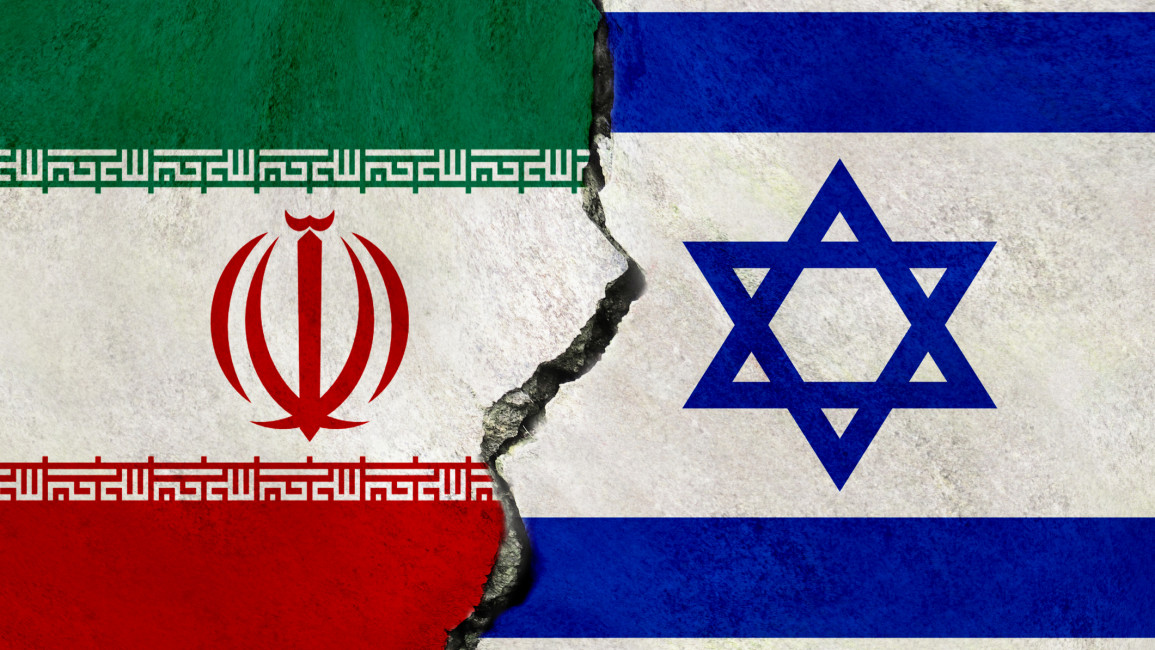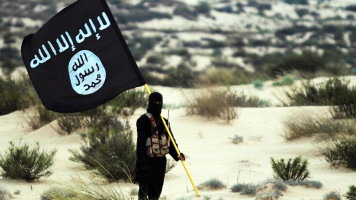Jordan 'foils arms plot as kingdom caught in Iran-Israel shadow war': report
Jordan has foiled a suspected Iranian-led plot to smuggle weapons into the US-allied kingdom to help opponents of the ruling monarchy carry out acts of sabotage, according to two Jordanian sources with knowledge of the matter.
The weapons were sent by Iranian-backed militias in Syria to a cell of the Muslim Brotherhood in Jordan that has links to the military wing of Palestinian group Hamas, the people told the news agency Reuters.
The cache was seized when members of the cell, Jordanians of Palestinian descent, were arrested in late March, they said.
In a statement on Wednesday, Hamas said it had "no ties to any acts targeting Jordan" and that it only sought to target Israel.
The alleged plot and arrests reported by Reuters come at a time of sky-high tensions in the Middle East, with an American-backed Israeli war on Gaza.
Hamas, the main Palestinian armed group fighting Israeli forces in the strip, is part of the Iran-led "Axis of Resistance" network of groups built up over decades to oppose Israel.
The two Jordanian sources, who requested anonymity to discuss security matters, declined to say what acts of sabotage were allegedly being planned, citing ongoing investigations and covert operations.
They said the plot's aim was to destabilise Jordan, a country that could become a regional flashpoint in the Gaza crisis as it hosts a US military base and shares borders with Israel, as well as Syria and Iraq, both home to Iranian-backed militias.
The sources didn't specify what weapons were seized in the March raid, though said in recent months security services have thwarted numerous attempts by Iran and its allied groups to smuggle in arms including Claymore mines, C4 and Semtex explosives, Kalashnikov rifles, and 107mm Katyusha rockets.
Most of the clandestine flow of arms into the country has been bound for the neighbouring Israeli-occupied West Bank in Palestine, according to the Jordanian sources.
However, some of the weapons – including those seized in March – were intended for use in Jordan by the Brotherhood cell allied to Hamas militants, they said.
"They hide these weapons in pits called dead spots, they take their location via GPS and photograph their location and then instruct men to retrieve them from there," said one of the sources, an official with knowledge of security matters, referring to the modus operandi of the smugglers.
The Muslim Brotherhood in Jordan, represented by its spokesperson Moath Al-Khawaldeh, said in a statement that "the group's policy is consistent and has not changed" and it is committed to Jordan's security and stability.
The statement condemned the association of the movement's name with such incidents it said were unrelated to it.
"Any behaviour contrary to the group's policies and decisions represents only the perpetrator," the statement said.
It condemned what was published by Reuters, saying it "contradicts professional and objective standards".
The statement added that the report attributes its narrative to unknown and unidentified sources, "without bothering to communicate with the leadership" of the Muslim Brotherhood to "confirm the veracity of the claims" it featured before publishing them and "dealing with them as facts".
Jordan foiled an attempt by foreign-backed militants to smuggle arms into its territory, seized the arms, and detained the smugglers in March, an official source told Jordanian state news agency Petra on Wednesday.
Petra did not mention the Muslim Brotherhood or name any country allegedly involved.
The Muslim Brotherhood is a transnational Islamist movement, of which Hamas is an offshoot founded in the 1980s.
The movement says it does not advocate violence, and Jordan's Brotherhood has operated legally in the kingdom for decades.
Jordanian authorities believe Iran and its allied groups like Hamas and Lebanon's Hezbollah are trying to recruit young, radical members of the kingdom's Brotherhood to their anti-Israel, anti-US cause in a bid to expand the Tehran's regional network of aligned forces, according to the two sources.
Reuters reported that a senior representative of Jordan's Muslim Brotherhood confirmed that some of its members were arrested in March in possession of weapons but said whatever they did was not approved by the group and that he suspected they were smuggling arms to the West Bank rather than planning acts in Jordan.
"There is dialogue between the Brotherhood and the authorities. They know if there are mistakes it's not the MB, only individuals and not MB policy," said the representative, asking not to be named due to the sensitivity of the matter.
Another senior figure in Brotherhood, who also requested anonymity, told Reuters the arrested cell members had been recruited by Hamas chief Saleh Al-Arouri, who masterminded the Palestinian group's operations in the West Bank from exile in Lebanon.
Arouri was killed by a drone strike in Beirut in January in an attack widely attributed to Israel.
Spokespeople for the Jordanian government and the US Department of Defense declined to comment for this article, while the Iranian foreign ministry wasn't immediately available.
Israeli officials from the prime minister's office and foreign ministry didn't immediately respond to requests for comment.
Over the past year, Jordan has said it has foiled many attempts by infiltrators linked to pro-Iranian militias in Syria who it says have crossed its borders with rocket launchers and explosives, adding that some of the weapons managed to get through undetected. Iran has denied being behind such attempts.
In a fix: Jordan's King Abdullah
Jordan's King Abdullah is walking a tightrope.
Most of his 11 million people are of Palestinian origin, because Jordan took in millions of Palestinian refugees fleeing their homeland in the turbulent years following the Nakba ("catastrophe in Arabic") and founding of Israel.
The Nakba saw some 750,000 Palestinians ethnically cleansed along the 1948 creation of the Israeli state.
Today, those Palestinians and their descendants number around six million and are mostly residing in the West Bank, Gaza, Jordan, Lebanon, and Syria.
The Gaza crisis has put King Abdullah in a tough position, struggling to reconcile support for the Palestinian cause with a long-standing US alliance and decades-old recognition of Israel.
The war has sparked widespread public anger, with calls by protesters to cut ties with Israel and street demonstrations erupted in recent weeks.
Last month, after Jordan joined a US-led effort to help Israel in downing salvos of drones and missiles fired in a retaliatory attack by Iran, critics posted concocted images on social media of the king wrapped in an Israeli flag with comments such as "traitor" and "Western puppet".
An Israeli attack on Iran's consulate in Syria's capital Damascus which killed seven Revolutionary Guards officers.
The disconnect between the government's position and public sentiment has never been more pronounced in the wake of the shooting down of the drones, according to Jordanian journalist Bassam Badari.
"There was discontent," he said.
"Jordan used to skilfully stand at an equal distance from all the countries in the region, but with its intervention Jordan aligned itself with the American axis."
Adding to Abdullah's concerns, any tension with the Brotherhood could also carry risks, said two Jordanian politicians who requested anonymity due to the sensitivity of the matter.
The group commands wide popular support in the country.
Jordanian authorities have not spoken publicly about the alleged weapons plot and the arrests.
One of the two Jordanian sources with knowledge of the alleged plot said intelligence officials had called in 10 senior Brotherhood figures to inform them that they arrested a cell that acted as a bridge between their movement and Hamas.
'No such thing as a Jordan option'
The Jordanian decision to join Western powers in the downing of Iranian drones bound for Israel was partly driven by fears among officials that the kingdom could be sucked into Iran's strategic struggle against Israel, according to Saud Al-Sharafat, a former brigadier-general in the Jordanian General Intelligence Directorate.
"The Iranians have instructions to recruit Jordanians and penetrate the Jordan arena through agents," he added.
"Their recruitment efforts span all segments of society."
Another motivating force for Jordan, according to many officials and diplomats in the region, was the unprecedented attack on a US military base in Jordan in January by Iran-aligned groups based in Iraq, which left three US soldiers dead and 40 injured.
A diplomat close to Tehran said the Iranian ambition to establish a proxy foothold in Jordan went back to Qasem Soleimani, the commander of Iran's elite Revolutionary Guards who was assassinated by the US in 2020.
Soleimani believed that given Jordan's strong ties with the US and the West, building up an allied group there capable of fighting Israel was crucial to Tehran's strategic ascendancy in the region, the diplomat told Reuters.
The hostility between Iran and Jordan dates back to 2004, in the wake of the US-led invasion of Iraq, when King Abdullah accused Iran of trying to create a "Shi'ite crescent" to expand its regional power.
King Abdullah defended his decision to shoot down the drones as an act of self-defence, not carried out for the benefit of Israel.
He warned that "Jordan will not be a battlefield for any party".
The military intervention also aimed to signal to Israeli Prime Minister Benjamin Netanyahu's government that Jordan was a crucial buffer zone for regional security, according to the two Jordanian politicians.
The Jordanian monarchy supports the establishment of a Palestinian state.
While some right-wing politicians in Israel have envisaged Jordan becoming an alternative Palestinian state, King Abdullah has repeatedly warned that there is no such thing as a "Jordan option".
"The official position is that a two-state solution is not only in Palestinians' interest," said Marwan Muasher, a former Jordanian foreign minister who is vice president for studies at the Carnegie Endowment for International Peace, a Washington-based think-tank.
"It is also in Jordan's interests because it will establish a Palestinian state on Palestinian soil rather than a state on Jordan's soil."
(Reuters, The New Arab)







 Follow the Middle East's top stories in English at The New Arab on Google News
Follow the Middle East's top stories in English at The New Arab on Google News

![Beirut stadium [Getty]](/sites/default/files/styles/image_330x185/public/1235817272.jpeg?h=a5f2f23a&itok=0UZr2fIL)
![Israeli forces destroyed a religious shrine in the village of Shama in southern Lebanon [Getty]](/sites/default/files/styles/image_330x185/public/2184560625.jpeg?h=a5f2f23a&itok=Ge_H4GfP)